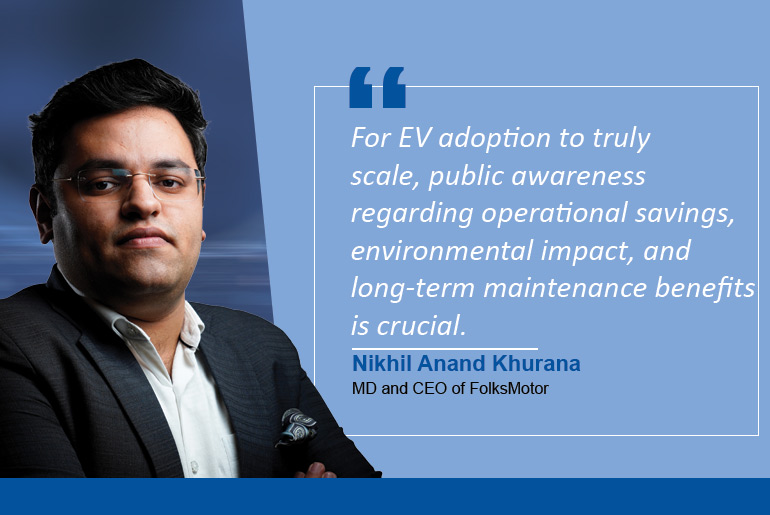Maharashtra is leading India’s electric mobility revolution, fueled by an ambitious policy framework, significant investments, and a flourishing ecosystem of innovators. With the state’s Electric Vehicle (EV) Policy targeting a 10% share of EVs in new vehicle registrations by 2025, Maharashtra is poised to become a key player in the nation’s sustainable transportation landscape.
Policy Framework and Ambitious Targets
The Maharashtra Electric Vehicle (EV) Policy, set to run until March 2025, outlines a comprehensive strategy for accelerating the adoption of clean mobility across the state. A central objective is for electric vehicles to constitute 10% of all new vehicle registrations. This ambitious target is further broken down: 10% for two-wheelers, 20% for three-wheelers, and 5% for four-wheelers.
To transform urban transportation, the policy mandates that 25% of urban fleet operators, including e-commerce platforms and mobility aggregators, transition their fleets to electric alternatives. Recognizing the importance of sustainable public transport, the policy also aims to electrify 15% of the existing bus fleet operated by the Maharashtra State Road Transport Corporation (MSRTC). To support this extensive transition, the state plans to install approximately 2,500 charging stations across major urban centers and strategic highway corridors, such as the Mumbai-Pune and Mumbai-Nagpur expressways, ensuring robust infrastructure for widespread EV adoption.
Robust Infrastructure Development
A strong charging infrastructure is crucial for widespread EV adoption. The Samruddhi Mahamarg (Mumbai–Nagpur Expressway) is slated to feature charging stations at 21 locations, significantly enhancing long-distance EV travel. Urban initiatives, such as MahaMetro’s plan to introduce 300 feeder buses in Nagpur, aim to improve last-mile connectivity and seamlessly integrate various modes of transport.
Industrial Investment and Innovation Powering Growth
Maharashtra’s industrial landscape is rapidly evolving to support the EV revolution. Stakeholders and companies are investing around $35 billion investment in the state’s EV, battery, steel, and green energy sectors. Additionally, the state plans to establish a gigafactory for Advanced Chemistry Cell (ACC) batteries. This strategic move will reduce reliance on imports and significantly foster local manufacturing capabilities.
Opportunities in Retrofitting and Sustainable Solutions
The shift towards electric mobility also presents significant opportunities for retrofitting existing vehicles with hybrid or electric systems. Such initiatives can substantially reduce emissions and operational costs, offering a practical transitional solution for both consumers and businesses.
In Maharashtra, a growing number of innovation-led solution providers are pioneering modular retrofit kits, AI-based diagnostics, and scalable service models tailored to local use cases—from two-wheelers and auto-rickshaws to intra-city delivery fleets. These approaches are not only making electrification more affordable and accessible but also reducing waste by extending the life of existing vehicles.
For small logistics companies, auto drivers, and even institutional fleets, retrofitting is becoming a gateway to cleaner transport without the capital expense of full vehicle replacement. End-to-end service offerings—covering everything from conversion to ongoing maintenance—are proving critical in building trust and ensuring quality outcomes.
Maharashtra’s holistic approach, encompassing policy, infrastructure, investment, and innovation, firmly positions it as a leader in India’s e-mobility journey. As the state accelerates towards its 2025 targets, abundant opportunities await stakeholders across the spectrum to contribute to and benefit from this sustainable transformation.
The Indispensable Role of MSMEs in the EV Supply Chain
The e-mobility revolution in Maharashtra cannot fully succeed without the active involvement of Micro, Small, and Medium Enterprises (MSMEs). These businesses are uniquely positioned to drive innovation, create jobs, and localize the EV supply chain.
Whether it’s in battery assembly, component manufacturing, retrofitting services, or maintenance and diagnostics, MSMEs can play a critical role in building a grassroots EV ecosystem. Policies that facilitate skilling, provide access to funding, and enable technology transfer to these enterprises will not only support the EV transition but also foster inclusive economic growth.
Furthermore, partnerships between small enterprises and larger technology providers can ensure a reciprocal flow of knowledge and innovation, leading to more efficient service delivery and product development within the e-mobility space.
Cultivating Public Awareness and Driving Behavior Change
Infrastructure and technology alone are not enough. For EV adoption to truly scale, public awareness regarding operational savings, environmental impact, and long-term maintenance benefits is crucial. In many parts of Maharashtra, particularly outside major metropolitan areas, EVs are still viewed with skepticism often due to lingering myths surrounding battery life, safety, or performance.
Targeted campaigns, pilot programs involving public transport and municipal fleets, and the sharing of real-world data can help dispel these doubts. Moreover, integrating EV awareness into educational institutions, driving schools, and community organizations can contribute to long-term behavioral shifts.
Maharashtra’s push for EVs is more than just an economic opportunity; it’s a profound transformation in how mobility is perceived, practiced, and powered. It represents a chance to redefine sustainability in a way that includes everyone from fleet owners and factory workers to mechanics and daily commuters.
Retrofitting, MSME empowerment, and decentralized infrastructure models are not merely supplementary elements; they are core pillars that can make e-mobility truly inclusive. As the state charges towards its ambitious future, success will hinge not only on policies and production, but on people, partnerships, and purpose.
The electric revolution is already here and Maharashtra is demonstrating that a bold, bottom-up approach may be the most powerful way to drive it forward.

